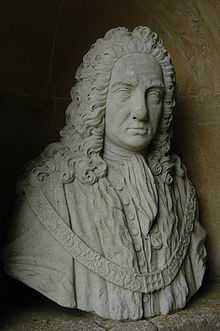John Barnard (British politician)

Sir John Barnard (c. 1685 – 28 August 1764)[1] was a British Whig politician and Lord Mayor of London.[2]
He was a son of John Barnard of London, a Quaker merchant, and his wife Sarah, daughter of Robert Payne of Play Hatch in Sonning on the border of Berkshire and Oxfordshire.[3]
He was a Sheriff of London in 1736 and elected Lord Mayor of London for 1737.[2]
He was elected at the 1722 general election as one of the four Members of Parliament (MPs) for the City of London.[4] He held the seat for nearly 40 years, until the 1761 general election.[2]
In 1734 he successfully promoted an Act of Parliament "to prevent the infamous practice of Stock-Jobbing". This Act, which was renewed in 1737, was known as "Sir John Barnard's Act".[5]
Barnard was an opposition Whig, opposed to the administration of Sir Robert Walpole. In a speech in March 1738 Barnard said:
A dishonourable peace is worse than a destructive war...All nations are apt to play the bully with respect to one another; and if the government or administration of a nation has taken but one insult tamely, their neighbours will from thence judge of the character of that nation...and will accordingly treat them as bullies do noted poltroons; they will kick and cuff them upon every occasion.[6]
Barnard gained a positive reputation as a "hammer of the Spaniards" and at Lord Cobham's country house at Stowe, who predeceased Barnard, an ornate bust commissioned of Barnard was included in its Temple of British Worthies, along with Elizabeth I and Sir Francis Drake.[7]
References
- Notes
- ↑ Edward J. Davies, “The Ancestry of Lord Palmerston”, The Genealogist, 22(2008):62-77.
- ↑ 2.0 2.1 2.2 D. W. Hayton, ‘Barnard, Sir John (c.1685–1764)’, Oxford Dictionary of National Biography, Oxford University Press, 2004 accessed 18 Oct 2009.
- ↑ Davies.
- ↑ Stooks Smith, Henry. (1973) [1844-1850]. Craig, F. W. S., ed. The Parliaments of England (2nd ed.). Chichester: Parliamentary Research Services. p. 209. ISBN 0-900178-13-2.
- ↑ London Stock Exchange (1986)
- ↑ Brendan Simms, Three Victories and a Defeat. The Rise and Fall of the First British Empire, 1714–1783 (Allen Lane, 2007), p. 252.
- ↑ Simms, p. 259.
- Sources
- London Stock Exchange (1986). Sir John Barnard's Act 1734. Reproduced from the original Crown Printers' Copies. Welwyn Garden City: Bournehill Press.
| Parliament of Great Britain | ||
|---|---|---|
| Preceded by John Ward Sir Thomas Scawen Robert Heysham Peter Godfrey |
Member of Parliament for the City of London 1722 – 1761 With: Peter Godfrey 1715–24 Francis Child 1722–27 Richard Lockwood 1722–27 Richard Hopkins (died 1736) 1724–27 Sir John Eyles 1727–1734 Micajah Perry 1727–1741 Humphry Parsons 1727–1741 Robert Willimot 1734–1741 Sir Robert Godschall 1741–1742 George Heathcote 1741–1747 Sir Daniel Lambert 1741–1747 Sir William Calvert 1742–54 Stephen Theodore Janssen 1747–54 Slingsby Bethell 1747–58 Sir Robert Ladbroke from 1754 William Beckford from 1754 Sir Richard Glyn from 1758 |
Succeeded by Thomas Harley Sir Robert Ladbroke William Beckford Sir Richard Glyn, Bt |
|